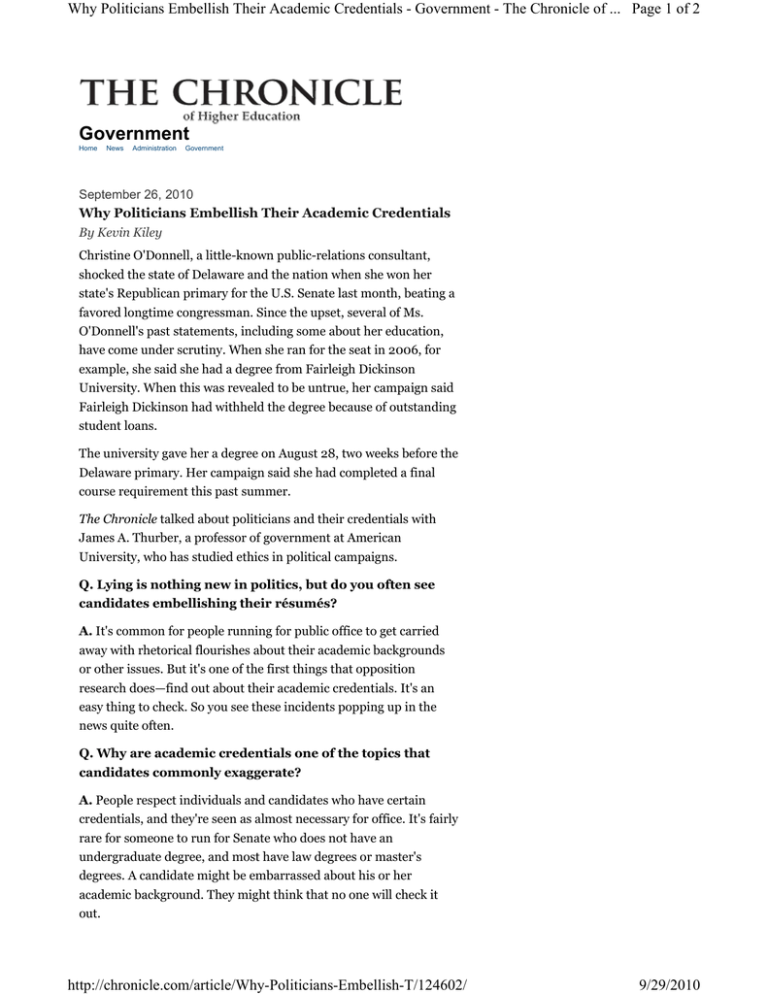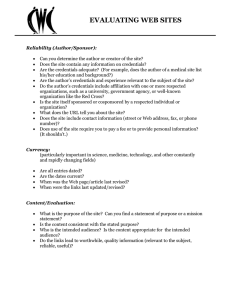
Why Politicians Embellish Their Academic Credentials - Government - The Chronicle of ... Page 1 of 2
Government
Home
News
Administration
Government
September 26, 2010
Why Politicians Embellish Their Academic Credentials
By Kevin Kiley
Christine O'Donnell, a little-known public-relations consultant,
shocked the state of Delaware and the nation when she won her
state's Republican primary for the U.S. Senate last month, beating a
favored longtime congressman. Since the upset, several of Ms.
O'Donnell's past statements, including some about her education,
have come under scrutiny. When she ran for the seat in 2006, for
example, she said she had a degree from Fairleigh Dickinson
University. When this was revealed to be untrue, her campaign said
Fairleigh Dickinson had withheld the degree because of outstanding
student loans.
The university gave her a degree on August 28, two weeks before the
Delaware primary. Her campaign said she had completed a final
course requirement this past summer.
The Chronicle talked about politicians and their credentials with
James A. Thurber, a professor of government at American
University, who has studied ethics in political campaigns.
Q. Lying is nothing new in politics, but do you often see
candidates embellishing their résumés?
A. It's common for people running for public office to get carried
away with rhetorical flourishes about their academic backgrounds
or other issues. But it's one of the first things that opposition
research does—find out about their academic credentials. It's an
easy thing to check. So you see these incidents popping up in the
news quite often.
Q. Why are academic credentials one of the topics that
candidates commonly exaggerate?
A. People respect individuals and candidates who have certain
credentials, and they're seen as almost necessary for office. It's fairly
rare for someone to run for Senate who does not have an
undergraduate degree, and most have law degrees or master's
degrees. A candidate might be embarrassed about his or her
academic background. They might think that no one will check it
out.
http://chronicle.com/article/Why-Politicians-Embellish-T/124602/
9/29/2010
Why Politicians Embellish Their Academic Credentials - Government - The Chronicle of ... Page 2 of 2
Q. What else do candidates commonly mislead about on
their résumés?
A. Military service is another topic that seems to get embellished a
lot. People saying they served in the military during Vietnam, which
doesn't necessarily mean they were in Vietnam. ... People get a lot of
credit for having served our country, and some people take
advantage of that.
Q. Why do public figures think they can get away with
misleading or false credentials?
A. Occasionally people will have something that's not true or
embellished on their résumé when they first start out, when they're
not the focus of attention, and they will not want to make a big fuss
about it later on, so they'll go along with it. They get away with it
once or twice and think they won't get caught. Sometimes people
begin to believe their own lie, and that's when it really becomes a
problem.
Q. Are there any similarities among the people who do
this?
A. They are usually amateurs. They are new to politics and usually
get into politics because of succeeding in something other than
public service. People with a long background in public service tend
not to make this mistake, or they've made it once before and they
know not to make that mistake again.
Q. What changes could stop this from happening?
A. It's not like you need a code of conduct coming from the
American Association of Political Consultants. You just need to
realize that, if you lie, the truth is going to come out, and it hurts
you. Sometimes, in the rhetoric of campaign speeches and rallies,
you can get carried away, but you've got to remember to tell the
truth. And if you exaggerate, you have to rectify it immediately.
Copyright 2010. All rights reserved.
The Chronicle of Higher Education 1255 Twenty-Third St, N.W. Washington, D.C. 20037
http://chronicle.com/article/Why-Politicians-Embellish-T/124602/
9/29/2010



